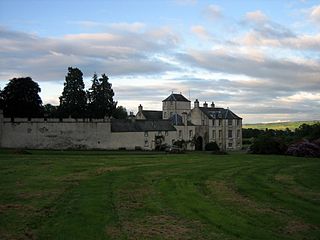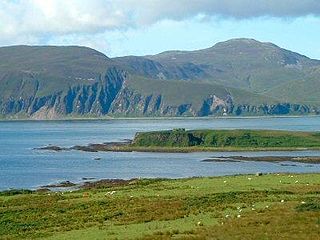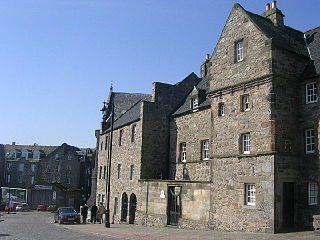Related Research Articles

Foulis Castle is situated two miles south-west of Evanton in the parish of Kiltearn, Ross and Cromarty, Scotland. It is a white washed mansion that incorporates an old tower house with gun loops. The castle was held by the Clan Munro from the twelfth century or earlier and they had a stronghold there.

Crawford Castle, substantially in ruins, is located on the north bank of the River Clyde, around 1⁄2 mile north of Crawford, South Lanarkshire, Scotland. The ruins stand on an earlier motte and bailey earthwork. The castle is also known as Lindsay Tower, after its former owners, the Lindsay family. The strategic location of the castle, at NS954213, guards the strategically important Mennock Pass from England into the upper Clyde Valley.

Claig Castle was a stronghold of the Clan Donald or MacDonald in the south of Scotland.

Clan Lindsay is a Scottish clan of the Scottish Lowlands.

Provost John Ross was Lord Provost in Aberdeen, Scotland from 1710 to 1712. Today he is most famous for the house he occupied in the 18th century from 1702.

Finavon Castle lies on the River South Esk, about a quarter of a mile south of Milton of Finavon village and five miles to the north-east of Forfar in Angus, Scotland. The name is applied both to a ruined 17th-century castle, as well as the 19th-century mansion house 130m to the west.

Milntown Castle was an early 16th-century castle which was situated near Milton, in Easter Ross, in the Scottish Highlands.
Contullich Castle was a castle located a few miles north-west of the town of Alness, on the eastern side of the county of Ross-shire, Scotland.

Clan Kirkpatrick is a Lowland armigerous Scottish clan. There are several variations of the Kirkpatrick name: Kilpatric, Kilpatrick, and Gilpatrick. The names Kirkpatrick and Kilpatrick may have been interchangeable at one time. The clan is recognised by the Court of the Lord Lyon, however the clan does not currently have a chief so recognised. The surname Kirkpatrick is also a recognized sept of Clan Douglas and

Borve Castle in Sutherland, Scottish Highlands is now a ruin. Formerly called the House of Burro. It was built in Kirtomy Bay near the hamlet of Farr. It is also known as Farr Castle.

Barscobe Castle is a 17th-century tower house in Balmaclellan, Kirkcudbrightshire, Scotland. It is a typical house of a country laird, and according to a panel above the entrance, was built in 1648. The L-plan tower was constructed using stone taken from Threave Castle. The main block is three storeys high with the stair wing one storey higher. The gables have a modification of crowsteps found only in Galloway. It is a fine example of a mid-17th-century house which was unoccupied for many years until 1971 when it was restored. It has a modern byre (barn) attached, which has been converted into a garage. Barscobe Castle is a category A listed building.

The Battle of Glasgow was fought on 16 March 1544, between Matthew Stewart, 4th Earl of Lennox and the Scottish Regent James Hamilton, 2nd Earl of Arran, and their adherents, during the minority of Mary, Queen of Scots. There was a second battle at Glasgow Muir in May 1544, known as the Battle of the Butts, between Arran and the Earl of Glencairn.

Ardpatrick House is a category-B-listed 18th-century country house in Ardpatrick, South Knapdale, Argyll and Bute, Scotland.

Loup House is a manor house north of Clachan on the Kintyre peninsula of Argyll, Scotland. The estate was once home to the chiefs of Clan MacAlister, and the chief still takes the name "MacAlester of Loup". Sir William Mackinnon purchased the estate in 1867.

Druminnor Castle is an L-plan castle, dating from the early 15th century, about two miles east of Rhynnie, in a steep valley by the Keron burn, in Aberdeenshire, Scotland.

Barnweill Castle was a castle located at Barnweill, in the parish of Craigie, South Ayrshire, Scotland.
Lamberton Castle was a castle located at Lamberton, in Scottish Borders, Scotland.
Wauchope Castle was a castle located at Wauchope, in Dumfries and Galloway, Scotland.
Barntalloch Castle was a castle located at Staplegorton, in Dumfries and Galloway, Scotland.

Rhymer's Tower, also known as Earlston Castle, is located near the village of Earlston, Scottish Borders, Scotland. The castle was the caput baroniae of the barony of Earlston. It was owned by the Lindsay family in the 12th century and passed to the Dunbar family in the 13th century.
References
- Coventry, Martin. Castles of the Clans: the strongholds and seats of 750 Scottish families and clans. Musselburgh, 2008. page 70.
- CANMORE - Byres